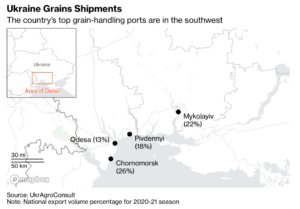A prolonged military conflict in the Middle East could potentially upend key commodity markets due to Iran’s control of the Strait of Hormuz, one of the world’s most important trade…
No Breakthrough in Russia, Turkey Talks on Sea Lane for Ukraine Grain Exports
Wall Street Journal writer Jared Malsin reported yesterday that, “Russian and Turkish officials ended talks Wednesday without a significant breakthrough toward creating a sea lane to export grain from Ukraine across the Black Sea as a part of a United Nations-backed effort to address a global food crisis.”
“Ukraine, which wasn’t part of the talks, hasn’t consented to any possible deal between Turkey and Russia, saying it needs guarantees that Moscow wouldn’t use a potential safe corridor to launch additional attacks. U.S. officials have also been skeptical of the Turkey-Russia talks given Ukraine’s opposition,” the Journal article said.
Malsin pointed out that, “A potential agreement would involve Turkish warships demining Ukrainian ports and creating a safe passage for ships carrying wheat and other products from Ukrainian waters.”
The Journal article added that, “In Washington, Treasury Secretary Janet Yellen told lawmakers that the war in Ukraine is driving up global energy prices and impacting food supplies. She noted wheat, corn and cooking oil prices have significantly increased.”
Reuters writer Naveen Thukral reported today that, “Turkish efforts to ease a global food crisis by negotiating safe passage for grain stuck in Black Sea ports met resistance, as Ukraine said Russia was imposing unreasonable conditions and the Kremlin said free shipment depended on an end to sanctions.”

Meanwhile, Bloomberg’s Aine Quinn reported yesterday that, “Removing sea mines near Ukraine’s key ports could take months, and hundreds of seafarers are still stranded in the region following Russia’s invasion of the country, according to the United Nations agency responsible for shipping safety.
‘Even if the ports wanted to reopen tomorrow it would take some time until ships could enter or depart,’ Peter Adams, special advisor on maritime security at the International Maritime Organization, said in an interview. ‘Completely removing sea mines in the port areas would take several months.’
Also yesterday, Reuters writers Pavel Polityuk and Tuvan Gumrukcu reported that, “A Ukrainian official also cast doubt on Turkey’s power to mediate the free passage of blocked Ukrainian grain.
“‘Turkey as a guarantor is an insufficient force in the Black Sea to guarantee the safety of cargo,’ director of Ukrainian grain traders’ union UGA Serhiy Ivashchenko told an online conference on Wednesday.
“He said it could take at least two-to-three months to remove mines from Ukrainian ports and that the Turkish and Romanian navies should be involved.”
The Reuters article noted that, “Ukrainian leader Volodymyr Zelenskiy said this week Ukraine had discussed with Britain and Turkey the idea of a navy from a third country guaranteeing safe passage for Ukraine’s grain exports through the Black Sea.”
And Marc Santora, Thomas Gibbons-Neff, Anton Troianovski and Michael Levenson reported on the front page of today’s New York Times that, “Russia has blockaded Ukraine’s Black Sea ports since the start of the war, trapping more than 20 million tons of grain meant for export and deepening a global food crisis. Dimming the long-term outlook, grain silos in Ukraine are still about half full, the Ukraine Grain Association said on Wednesday, raising the possibility that much of this year’s crop could be left in the fields.”
The Times article explained that, “[The Turkish foreign minister, Mevlut Cavusoglu] said that a mechanism was needed to get not just agricultural products from Ukraine out through the Black Sea, but also Russian fertilizer, which is vital for global agriculture.
“He suggested that the answer lay in a United Nations proposal that the international community provide guarantees for the shipments that addressed security concerns on both sides.
“Ukraine was not invited to the talks in Ankara, and its government and Russia’s each blame the other for the lack of exports.”
Today’s article added that, “The United States has cited satellite imagery of cargo ships to accuse Russia of looting Ukrainian wheat stocks that it exported, mostly to Africa, echoing Ukrainian government allegations that Russia has stolen up to 500,000 tons of wheat, worth $100 million, since it invaded Ukraine in February.”
Reuters News reported yesterday that, “Russia has stolen about 600,000 tonnes of grain from the occupied Ukrainian territory and exported some, the deputy head of Ukrainian agriculture producers union UAC said on Wednesday.”





